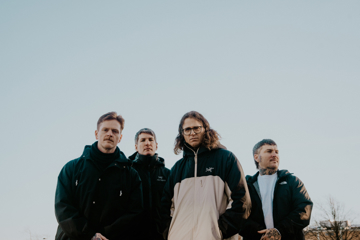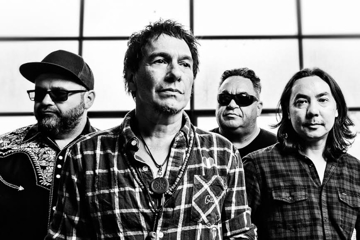'Black Panther' Might Be The Wokest Marvel Film, But Is It The Best?
'It’s not even the best MCU movie of the past six months.'
BLACK PANTHER

warning: potential spoilers ahead!
Woah, woah, woah. With pre-release hype reaching dizzying levels, let’s just pump the brakes a little. Black Panther isn’t the greatest comic-book-flick ever, or the best Marvel movie, or a modern-day masterwork of the genre. It’s not even the best MCU movie of the past six months. Taking Black Panther as, simply, a piece of cinema —not as paradigm-shifting representational event— Ryan Coogler’s film is, instead, an exemplar of what most Marvel movies are: perfectly fine, genuinely enjoyable, ultimately-non-threatening popcorn-picture entertainment.
Don't miss a beat with our FREE daily newsletter
18 flicks into the MCU, a lot of this feels plenty familiar: the uninspiring CGI, the host of fight-sequences, the product placement, the zany Stan Lee cameo, the comic relief, the gentle sprinkling of socio-political themes, that moment when the titular hero is left for dead only to miraculously survive, the finale in which he fights an evil version of himself (Nega Panther!), and the mid- and post-credits teasers (Bucky!).
There’s the obligatory first-act news-reports talking about past events from prior Marvel movies, situating this narrative within the studio’s grander sprawl of cross-promotional cinematic properties. For all the buzz about Kendrick Lamar’s contributions to the soundtrack, when things get dramatic, the same old string-section swells up in generic orchestral grandeur. And, as groundbreaking as its portrait of an African superhero is, all of Black Panther’s vivid visions of fantastical savannahs were shot, as per MCU usual, on a digital backlot in an industrial park in Atlanta.
Now that all those simple truths have inured us to a dose of Black Panther fever, let’s get stuck in. Black Panther begins, of course, in the wake of the events of Captain America: Civil War, where Chadwick Boseman’s titular hero saw his daddy die —replete with dramatic final words— in a terrorist blast. Given pops is King of the mythical, fictional nation of Wakanda, BP must go back home to ascend to the throne; the entrenched elitism and exclusionary power-structure of patriarchal/monarchical heredity going unquestioned.
The film, instead, wrangles with the well-trodden dramatic themes of royalty and throne-ascension: the “I’m not ready to be king” chat, solemnly-intoned platitudes like “it’s hard for a good man to be a king”, and, ultimately, the daddy issues that come up with both living up to a father’s burden and wanting to step out of his shadow. To become king, though, Boseman has to first defeat any challengers from the gathered tribes of Wakanda, in a thunderdome set in an ankle-deep rockpool halfway up a waterfall; whereat he and Winston Duke essentially stage an MMA bout with the future of the nation on the line.
Once Duke taps out, and Boseman goes through a psychedelic, bioluminescent-flower-trippin’, shamanic-vision-quest to meet the Dead Dads of the Ancestral Plane, he sets about the business of Wakandan rule: pow-wows with tribal councils, instructions for the spear-clutching women that’re his personal troop of warrior bodyguards, and visits with Q-esque sister Letitia Wright in her high-tech, gadget-spawning lab. These gadgets are —and the film itself is— a kind of Afrofuturist fantasia, in which the ultra high-tech (spaceships, nano-tech superhero-costumes, gamer-friendly remotely-piloted cars/planes) and traditional (warpaint, facemasks, spears, ritual) are wed together. This is best embodied in the space-age bracelet that serves as veritable Wakandan mobile: at an inopportune time, Boseman goes off with love-interest Lupita Nyong’o, but leaves his “beads” switched off.
The whole production —from Coogler through composer Ludwig Göransson to a host of art directors and animators— are tasked with making this marriage aesthetically pleasing and artistically resonant. Black Panther must match the sci-fi gleam of tech-obsessed comic-book movies to visual motifs both traditional tribalist and modernist Afro-punk; all without making it seem like a work of exotifying ‘World Music’-esque fusion. Results are varied; there’re moments, herein, that’re undeniably clunky.
Black Panther’s action-movie narrative really gets rolling when Boseman, Nyong’o, and head warrior bodyguard Danai Gurira go off —to shot-on-location Busan, Korea— in pursuit of Andy Serkis’s Ulysses Klaue. A head-tatted, garrulous, giddy-with-recalcitrance South African mercenary last seen cameo-ing in Age Of Ultron, Klaue once stole vast quantities of Wakanda’s all-everything source-of-power/MacGuffin, vibranium. Here, Serkis proceeds to, instead, steal scene after scene (singing the refrain to Haddaway’s What Is Love? when tied up for torture and questioning = lulz). Where much of the cast —especially Boseman, Forest Whitaker, and Angela Bassett— are so stoic and noble as to appear stiff, Serkis is clearly having a blast; stepping out of mo-cap anonymity to play his first-half heel as ridiculous, comic creation.
In another familiar Marvel move, Serkis is the misdirection villain; the first foe that leads to the ultimate one. And, here, gladly, that’s Michael B. Jordan, as Wakandan in exile, a disenfranchised African-American who’s returned to the homeland he never knew, intent on insurgency. He’s the catalyst not only for the classical narrative —brotherly betrayal, usurping of thrones, rightful heirs returning from the wilderness, climactic battles— but for the most interesting thematic elements at play in Black Panther.
Jordan (whose villainous name, Killmonger, is so comic-book it hurts) is a militant revolutionary, out to seize power so as to redistribute the means of force. In the mythology of Black Panther —spelt out in an ugly-CGI opening in which folklore is told through vibranium’s mock-mineral grains; an opening that fares poorly when compared to beginning of Kathryn Bigelow’s Detroit, a hand-painted animation heavily inspired by Jacob Lawrence’s Migration series— Wakanda is the world’s most technologically-advanced nation, but chooses to ‘hide in plain sight’. Some kinda magical force-field (it’s never explained) keeps its glittering metropolis hidden, the rest of the world seeing it as a third-world backwater; the country not engaging in international diplomacy or aid, so as to keep its riches to itself.
This is what drives Jordan’s character, whose idealism and ardour and charisma are enough that he’s that best kind of villain: one who makes you wonder whether he, not the hero, is on the right side of history. Jordan argues that, with billions of Africans —on both the continent and in the diaspora— living in poverty, why should its wealthiest country keep its power a secret? Sure, he wants to use that power to turn the tables, become not the oppressed, but the oppressor, but, otherwise, his reasoning is wise: where is the ‘right’ in dwelling comfortably inside a sealed-off enclave while others outside of it suffer?
This is essentially a debate of the morality and politics of a utopia, with the script’s evocation of closed-down borders (“you let the refugees in, they bring their problems with them,” counsels pal-to-the-crown Daniel Kaluuya, about opening up to the outside world) giving it real contemporary political resonance. By the time the film finds Gurira mocking the cultural “disgrace” of wigs/weaves and Jordan evoking the slaves who leapt from ships (“they knew death is better than bondage”), Black Panther does earn a ‘most’ superlative: this, surely, the most ‘woke’ comic-book blockbuster (also: multinational corporate overlords adopting wokeness to curry favour with consumers: discuss).
But, as with these explosion-filled, cosplay-rich tentpole pictures, these deep themes are never truly explored; trenchant socio-political debate always, eventually, solved by two men in costumes having a fistfight (speaking of debate: the credits list the members of something called the Marvel Studios Parliament, which is amazing). Whilst it’s wondrous to see an MCU movie unafraid of big questions —to Coogler, it’s a film about what it means to be African— and great to see gags like Wright mockingly calling Martin Freeman’s CIA-stooge-cum-unlikely-hero “coloniser”, this alone doesn’t make Black Panther some cinematic triumph.
For, it’s also a film in which Kaluuya rides an armour-covered CGI rhinoceros into battle, where the death of a beloved elder is met with a classic fall-to-knees/pullaway “nooooooooooo!” shot, where there’s a spaceship dogfight set to a ticking-clock countdown, and where whole sequences seem designed to be turned into video-games. Meaning, for all its cultural weight and of-the-zeitgeist resonance, Black Panther is, as work of art, just another superhero-movie, another big-studio product.







